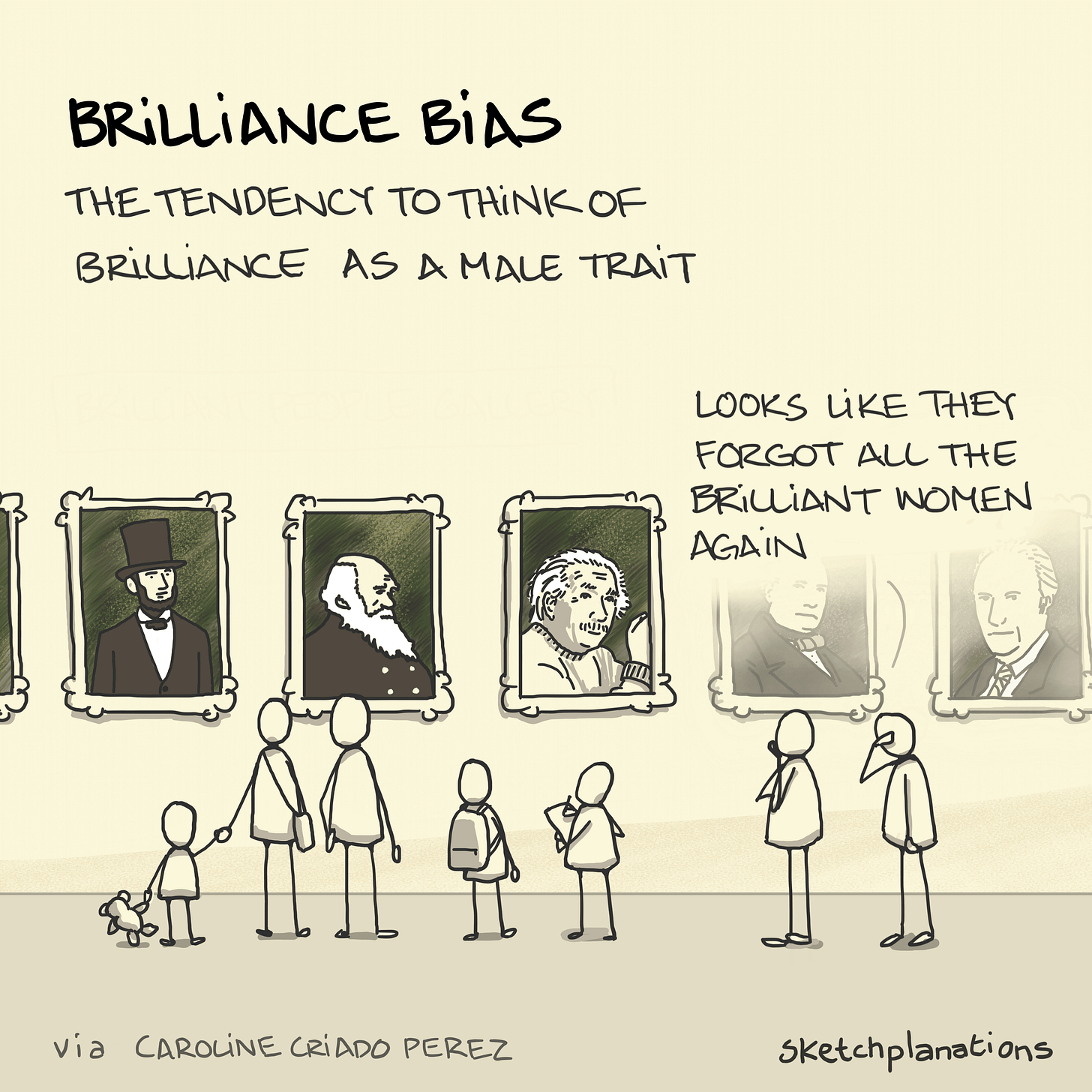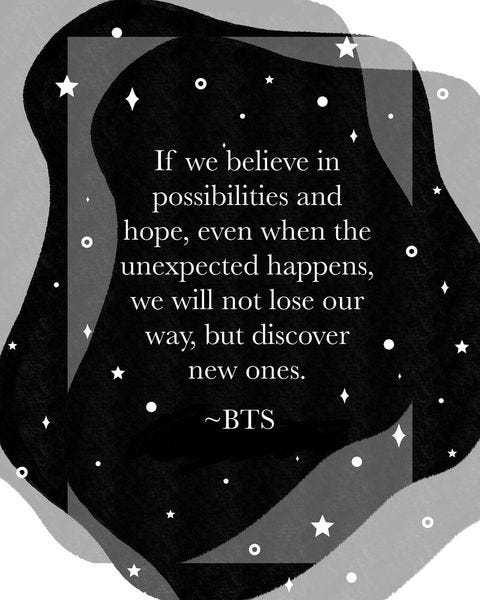More brilliant women have shaped our world than we'll ever know
Taking a moment to acknowledge how much women have changed our lives without any credit.
Did you know that Yoko Ono co-wrote Imagine?
It's okay if you don't. She's only been credited as a co-writer on the track since 2017, 40-ish years after the song was released.
The reason? John Lennon was too "macho" to acknowledge her contribution.
"A lot of it - the lyric and the concept - came from Yoko," he said. "But those days I was a bit more selfish, a bit more macho, and I sort of omitted to mention her contribution."
It should be shocking how easily Lennon was able to dismiss Ono's work on what would become one of history's biggest tracks. But he's hardly the first (or the last) person to do this.
History is written by the winners
In this case, it's also written by those who can literally write. When you withhold formal education from women and don't allow them to read or write, obviously, we won't know about all the brilliant women who've changed the way we live today. So many of them have been overshadowed by males around them simply by virtue of being a man.



Men have been "omitting" women's contributions across time and space — music, entertainment, science, technology, economics, literature. Every field has ignored women and what they've accomplished in favour of championing men.
Take a moment to think of a scientist who isn't a man. Marie Curie is probably the first one to pop into your head. Fun fact — her husband had to say that he wanted to share the prize for the judges to award her the Nobel.
For her research in "radiation phenomena," Curie became, in 1903, the first woman to receive a Nobel Prize. French academics originally proposed only her husband and Henri Becquerel, but Pierre Curie insisted that his wife share the honour.
How absolutely infuriating.
Imagine putting your life on the line for science and discovering a new element (plutonium) and being at the mercy of male academics who'll only listen to your husband?
Even today, male academics are quick to dismiss Marie Curie's contributions and consider her "a mere helper" with Pierre making the breakthroughs.
The Brilliance Bias
Brilliance bias is the tendency for people to think of 'brilliance' as generally a male trait. With fewer women generally recorded in the history books, the brilliant people that come to mind from a young age tend to be men.
Now, Pierre Curie respected his wife enough to acknowledge and credit her formal contributions.
What about the women who were the reason men could do all those life-changing things in their careers?
They were paid dust.
These women supported their husbands by doing all the heavy lifting — chores and childcare to start with, not to mention typing out stuff and helping with primary research. That's what gave these men time to experiment and figure out solutions to problems.


Society didn't give women that freedom at all. Men wouldn't stay at home to support their wives ambitions or interests for the longest time (and it's still heavily debated to this day). It makes me wonder, what if the cure for cancer would've come from a highly intelligent woman who wasn't allowed to study and work on her ideas?
Although, even if a woman had come up with the cure for cancer, I'm sure a man would've swooped in and taken credit for it. I can even back it up with something similar that happened to Candace Pert, The Goddess of Neuroscience, who discovered the receptor that allows opiates to lock into the brain as a grad student at Johns Hopkins. It led to an award — for her male professor. When she protested, her professor, who I don't care enough to name, said, "That's how the game is played."
Wondering if I'd get there quicker if I were a man
Now, in the 21 C, some women have learned how to play the game. Unfortunately, they've changed some of the rules, so we're fighting a different battle, an uglier kind.
My favourite example of a fierce woman who keeps having her value undermined by both media and men — Taylor Swift.
Almost everyone can belt out You Belong With Me (and dozens of other Swift tracks) because they're just that good. But how many of us shied from calling ourselves her fans simply because we didn't want to be associated with a woman who the media was conveniently slut-shaming?
It wasn't until the mostly male experts, and critics started "approving" her music and enjoying it that most of us began calling ourselves Swifties (around the time Red and 1989 came out).
Recently we came full circle when the media began hating on her again for taking ownership of her music — the lyrics she wrote, the songs she composed — that a man had used for his advantage.
Swift herself pointed it out.
"There's a different vocabulary for men and women […]. A man does something, it's 'strategic'; a woman does the same thing, it's 'calculated'. [...] A man is allowed to 'react'; a woman can only 'over-react'.
A man does something? 'Confident and bold.' A woman does it the same way, and she's 'smug.' A man 'stands up for himself,' [whereas] a woman 'throws a temper tantrum."
Small but important fixes
The media has a huge hand in how we perceive women and their contributions. If they hadn't demonized Yoko Ono, calling her anathema to the Beatles, maybe Lennon would've been more comfortable acknowledging her contributions from the get-go.
In journalism, if you're talking about a woman in STEM, you'd fail The Finkbeiner Test if you mention one of the seven topics regarding her womanhood —
The fact that she's a woman
Her husband's job
Her childcare arrangements
How she nurtures her underlings
How she was taken aback by the competitiveness in her field
How she's such a role model for other women
How she's the "first woman to…"
"The fact that she's the first woman to do that says a lot more about the prize-giving committee than it does about her," Finkbeiner explained in our interview. "So if I were going to put that into a story, it would be a story about prejudice in that prize committee."
We owe it to women in our past, present, and future to acknowledge their contributions and respect the amount of effort they put into bettering our lives today. Men, in particular, need to spearhead this from places of recognition and power — highlight previously unknown or dismissed contributions and make sure that students learn about the brilliant women who played significant roles in changing the world as we know it.
Here are three small ways to do that —
Men, stop speaking over women and stop taking credit for their ideas at meetings, conferences, and whatnot.
People in power — pay women the same as their male counterparts, especially if they're WOC and don't expect them to work for free or for exposure.
Women, do your best to stand up for yourself and remember to cut out those who won't stand up for you. Protect yourselves and your work because the men writing our history sure as heck are.
I’d love to know what you’d like to see more of in this newsletter. Any topics I should cover? Anything specific you want me to explore within books, freelancing/career, and the general pop culture umbrella? Please hit reply to this email or use the anon feedback form below to let me know! x
I’m also gathering reader testimonials to add to my new About page, so if you’ve liked an issue or two — tell me about it? I’d love to showcase your words (and link back to your work, too!).
Your feedback helps me improve this newsletter!
Weekly faves! 💌
A few issues ago, I'd shared 99 bits of unsolicited advice that you guys really enjoyed. Here are 99 bits of additional unsolicited advice from the same person.
Along with dismissing women's contributions, we've been rather unkind to female fans — especially if they're fans of a female artist like Taylor Swift. Here's my take on why teenage girls deserve way more respect than they get for making global superstars.
Want to read some great articles this weekend? This website might be a haven for you. Timeless pieces curated across a variety of topics.
TikTok's banned where I am, but I've spent enough hours on Reels to understand what this creative case study explores about addictive feeds.
Remember when I talked about working/studying together with friends? Here's a nice website where you can set small to-do lists and study/work virtually to keep yourself accountable and be more productive.
Finally, here's a nice reminder for you —
If you liked this edition, please hit the 🖤 at the top of this email or right under this — it helps more readers find my newsletter! Please consider buying me a ☕ to support my work and share this issue to motivate me!
See you next week!





